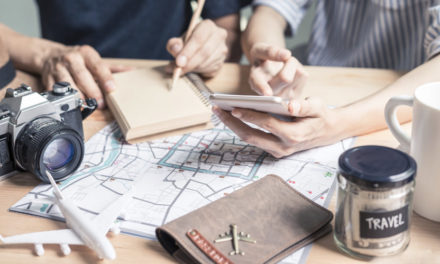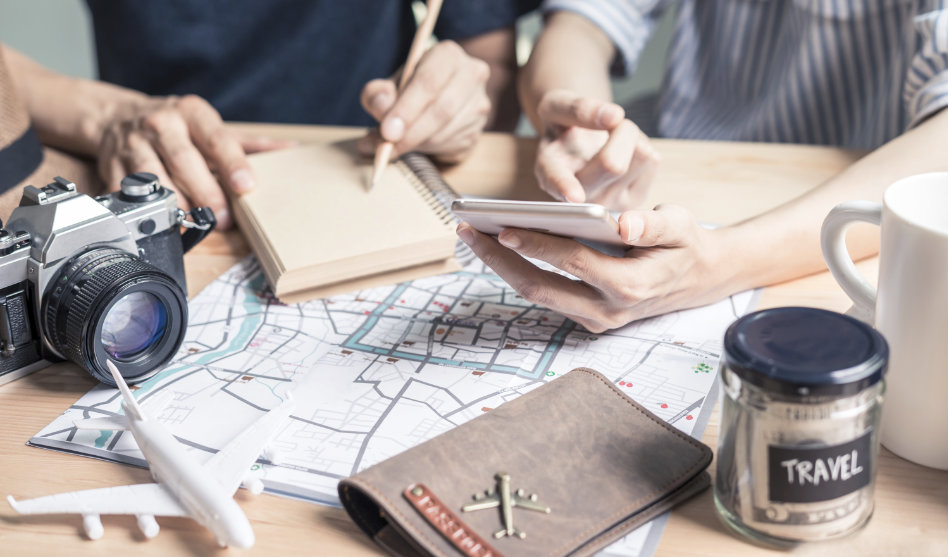Traveling is one of the best ways to experience the world, but it can also be a costly endeavour. From plane tickets to hotel rooms, travel planning is a big time commitment that can require a substantial investment, especially if you’re planning an international excursion.
However, there are plenty of ways to save money and still have a great time. The following travel planning guide will help you organise a memorable trip while saving time and money every step of the way.
Should I plan my own trip or hire a travel agent?
When you’re planning a trip, it’s easy to get overwhelmed by all the different travel options that are out there. A travel agent can help you book everything and make sure it all goes seamlessly. But, if you’re willing to do a little bit of extra research and legwork, you can plan the whole thing yourself while saving money in the process.
When booking through a travel agent, you'll often need to stick to their predefined routes, accommodation and schedule. Planning a trip yourself means you can create your own itinerary based on your preferred destinations, accommodation needs, and schedule.
Planning your own trip means you have complete control over the itinerary and the ability to tailor every detail to your own requirements. The earlier you start planning your trip, the more likely you are to find cheaper airfares and accommodation, so it's important to think ahead – at least a few months before travelling.
Select your desired destination(s) and travel dates
In order to avoid confusion and to find the best itinerary that fits your travel preferences, it’s important to know “when” and “where” you're going.
If you already know “when” you're planning to go away, then you can focus your efforts on the “where” based on popular destinations at that time of year. Some destinations are only really suitable at certain times of the year. It's important to choose the destination(s) based on the season, so you're not going during the rainy season or when everything is closed down for the winter for example.
If you don't already have a date in mind, then you can start with the “where”, selecting the top destinations you've always wanted to visit. You might find it helpful to create a list of desired destinations and note the ideal seasonal dates next to each. This way you will be able to select the desired location around the same time you'd like to go away.
When selecting a destination based on seasonal dates, you should try to avoid peak times. The best time to go is near the beginning or end of a high season when costs for travel and accommodation are lower. You'll also still be able to take advantage of all the activities available, while there are less tourists to get in your way.
Once you’ve found the places you’re most interested in and the dates you’re looking at, it’s time to make a final decision based on your budget.
Set a budget and identify areas you are willing to compromise
Now you have an idea of the places you'd like to visit and the approximate dates you'd like to go, you'll next need to set a budget for how much money you have to spend on your trip. Set a maximum budget for your trip and add it to the itinerary so you stick to it.
You'll want to make sure you've got enough money to do everything you want, while also keeping within your means – so you're not getting into debt while away. Your budget will determine which destinations it will be feasible to visit, and the amount of time you can spend there.
Perform some preliminary research on the cost of flights to each of the destinations chosen and the price range for various accommodations. These rough figures can be added to each of the destinations highlighted in the previous step, so you can determine an approximate cost for each.
You will also want to include part of the budget for food, drinks and entertainment while away, so be sure to include an estimated cost for these on the itinerary.
Once you have worked out the general cost of visiting each destination, you'll be able to easily identify the final option that fits in with your budget and time restraints.
Research activities and specific places to visit on your trip
Before you book your trip, make sure you’ve done your research so that you know what you want to do and see. Ideally, you’ll know what you want to do before you leave home, so you can make the most of your time away. Trying to organise activities and excursions while on your trip can be stressful and often works out more expensive than booking (or at least researching) in advance.
Add each of the activities to your itinerary based on the number of days you will be away. You should also leave some days free for relaxing and other activities you might only find out about during your trip. You don't want to plan each day meticulously, as plans can change and some things may be weather dependent, so include flexibility to swap things around on the list.
Now you have noted down the general costs and optimum dates for each destination, you can make a final decision on the destination and start booking flights, accommodation and activities.
Booking Flights, accommodation and activities
The first thing you want to do is book the flights for your trip, which will then determine the available accommodation during those dates. The preliminary research performed in the previous steps should help speed up this process, as you will already have a good idea of costs and how different airlines compare.
There are a wide range of tools and comparison sites online to help with this process, so be sure to use as many as possible to find the best rates. Many of these tools also have the option to set alerts to notify you when flight prices change and track fare changes over time, so it might be helpful to set these up well in advance of the trip to find the best prices.
Don't forget to look at alternative routes to your destination – if the trip requires multiple stops on the way. You can often find cheaper fares by taking a different route, but bear in mind this could extend traveling times and may require an overnight stay, so this should be included in the overall costing of travel.
Once you have booked your flight, you now want to turn your attention to accommodation. Using the list of locations and activities you want to take part in, search for accommodation in easy reach of these. Think about splitting your trip into smaller stays in various areas, so you can easily explore each location without having to pay over the odds for transport each day. If you just want to stay in one location for the entire trip, then you may want to hire a car – which can often work out cheaper than public transport over the length of your stay – if you are using it each day to go further afield.
Finally, take a look at the attractions and events you'd like to visit on your stay, as it can often cost less (and reduce stress while away) if you book these in advance. Again, these can often be booked through third party comparison sites, so be sure to shop around to find the best deals.
Investigate any other requirements prior to travelling
Now you have everything booked for your trip, it's time to turn to other requirements required before you set off.
Download any flight, accommodation and activity confirmations, and store them in a central location. You can also send these to your phone so you have easy access to them while away. There are many apps available online and on the phone to help keep everything organised and easily accessible on the move.
You may also need a visa depending on your destination. If you’re unsure about the process or requirements for obtaining a visa, you can always ask a local travel organisation about the latest rules and visa requirements.
You can also check on the local government websites for the destinations you are visiting to find out if you will require a visa and which type you will need to apply for. You'll also want to check your passport to ensure there is enough time remaining before it expires, as many countries require at least 6 months validity.
Take the time to research any vaccines required prior to travel (as these often need to be administered weeks before flying) or medicines you might need while away. A simple first aid kit can come in handy for any scrapes, bruises, stings or minor medical eventualities. Any prescription medication you take regularly should be ordered in advance and prescriptions packed with these to avoid complications during travel.
To ensure that you're ready for any potential issues during your trip, it's advisable to obtain travel insurance. Depending on your trip, you might need standalone travel insurance, international travel insurance, or a combination of both. Search for the best deals online, but remember to check that all activities you may undertake while away are covered in the policy.
A week or so before traveling you also may want to inform your bank about the trip, preventing them from placing a block on your card while you're away. There are also many online banks which will allow you to easily exchange currency with better rates, and without costly transaction fees at the ATM, so it's worth investigating these options prior to traveling.
After following the above steps you should be in a good position to make the most of your trip, and visit all the places you want to see with the minimum of stress. As with anything in life, best laid plans don't always work out, so ensuring you're well prepared before travel will reduce any risks of complications and mean you're well equipped to find alternative options if required.
If you have any other travel planning tips to save time and money, then please leave a comment below.




















